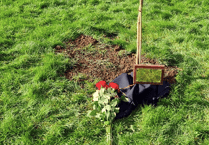IT would seem that we’re heading towards the dying embers of radio as many of us have always known it. After all, local, commercial radio is almost as rare as an unbroken election pledge or sightings of the Beast of Bodmin Moor nowadays.
Slowly, much like how the doomsday clock reaches closer to midnight, the armageddon of the embers of the radio we knew and loved is coming; as the final soldiers of traditional commercial radio presented by local people, based locally is wiped aside by the Bauer and Global media juggernauts, to be replaced by celebrities and unified brands all in the name of ‘progress’.
For some, the change is like a drop of honey, as they sup up the sweetness of mass radio brands masquerading in the large flag of nostalgia, while for others, it is like a drop of Bittrex, leaving a nasty taste as the radio stations and presenters they loved become consigned to a happy memory and the history books of how our parents used to live.
Perhaps, it’s just a sign of a changing world, and maybe, much like the advent of commercial television was resisted by those who thought it would corrupt their children, perhaps in a social media world, we should embrace the possibilities of hearing the same show wherever we are in the country with an FM Radio, like we always have Classic FM or BBC national radio.
At this point, the radio anoraks, of which we at NCB Radio are included, will rear their heads in indignant rage and say, ‘local radio isn’t dead, we’re doing community radio’, and you’d be right in that respect. The question we should all ask ourselves is, for how long? How does local radio reach the communities of the future, and answer the existential question asked by media =titles all across the land.
It certainly isn’t solely relying on FM Radio, or by acting as if time stood still; unfortunately, the revolutionary wave of FM stations which launched in the 2000s and early 2010s have begun to start to struggle, or have always struggled, and in some cases ceased to exist. These stations were in some cases strangled by OFCOM constraints on revenue gathering which was introduced to protect the local commercial radio which no longer exists, something the Community Media Association have long campaigned to get rid of.
There is still a value in the future of local radio, made by communities, for communities. But there are questions we must all ask as we seek to fill a gap left behind by the sinking of the good ship HMS Local Radio.
Standing still isn’t an option. Perhaps it’s time we start the discussion we’d all rather avoid and work out how we, as community radio stations, can not only survive in a media world changing around us, but rather, thrive and reinforce the importance of what genuinely local radio means not only to us, but those around us left behind by the tide of “brands”




